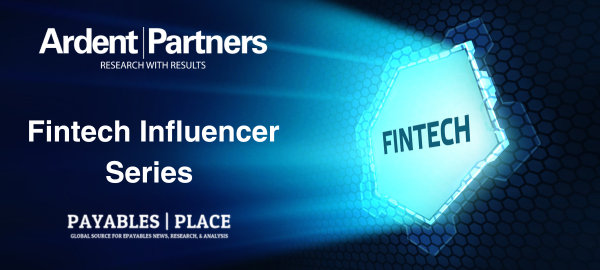Ardent’s FinTech Influencer Series highlights innovative voices in the world of Accounts Payable (“AP”) automation. This series is the go-to spot for progressive thoughts on how technology, transformational thinking, and revolutionary ideas are changing how AP work gets done. We continue our FinTech Influencer Series today with Part 1 of a two-part discussion with Andres Ricaurte, SVP & Global Head of Payments, at Mphasis.
Ardent Partners: Welcome Andres, thank you for spending some time with me today. Let’s get started. Please tell me about your background, your company, and how you ended up in the Payments industry?
Andres Ricaurte: I have been in payments for more than 15 years, currently at Mphasis and most recently at Amex. I am also an active advisor, board member and investor for start-ups in the payments and fintech space.
I joined Mphasis earlier this year as SVP & Global Head of Payments. We are a Blackstone-backed global IT solutions provider with deep roots in financial services and a strategic focus on cloud, cognitive and other emerging technologies. The focus of our Payments business is to improve global commerce by creating a smarter payments ecosystem. We work with financial institutions, corporate clients, commerce platform providers and start-ups to help them create competitive and disruptive advantages by re-architecting their payments value chain.
As an engineer by training, I have always been attracted by the breadth and complexity of the payments ecosystem. I began my career at American Express in Latin America where I had the opportunity to launch, manage and redesign several payments products and partnerships throughout the region. I came to the US nine years ago to lead different innovation initiatives for Amex’s Global Commercial Services business. Most recently, I led Amex’s B2B digital platforms business from initial incubation to market deployment.
Ardent: What is your perspective on the P2P market today?
AR: Most of the innovation in payments has focused on removing friction from the consumer experience, making transactions practically invisible. We no longer think about taking a card out of our wallet, exchanging cash or writing checks. We simply lodge our favorite payment methods in our mobile device and go about buying coffee, ordering car rides, streaming music, making investments, and even splitting the bill between friends; all while payments happen magically behind the scenes. And, once a transaction is made, a myriad of financial management tools and apps are provide us with visibility, controls, analytics and recommendations.
This is not the case in the world of business to business payments where 9 out of every 10 transactions still rely on some form of paper trail such as an invoice, contract, purchase order or receipt. These highly inefficient B2B flows account for 85% of the world’s total payment volume, so the opportunity for transformation is massive.
In recent years, we have started to see significant uptake in the adoption of software tools that help businesses digitize and automate certain B2B processes. This includes solutions like electronic invoicing, billing, supplier management, and accounts payable automation. One of the key problems is that these systems typically don’t talk to one another and therefore end up being used as ‘point solutions’ that only provide partial or incomplete information related to the specific task they were implemented for.
As a result, critical business activities like understanding cash flow, optimizing liquidity, and balancing payment terms between buyers and suppliers, still rely on significant human intervention and complex manual analysis. Even simple tasks like reconciling payment transactions, or obtaining a full picture of a company’s total spend require cumbersome operational processes.
Ardent: How has the market/industry changed in the past five years and what do you think it will look like five years from now?
AR: Five years ago I don’t think Customer Experience was a concept that solution providers were focusing on. Today it is top of mind; and it shows. Simple design, multi-factor and omni-channel access, and several releases per quarter, are now common in the industry. Additionally, as business software tools become more intuitive, it is easier for smaller organizations to gain the same digital advantages that were only available to large enterprises.
“Spend Management” is another concept that has emerged over the past few years and is probably here to stay. Five years ago we had T&E solutions, procurement solutions, contingent labor solutions, etc. Today you are seeing most providers blend or expand their offerings to provide support for all categories of a company’s spend.
Additionally, the last five years have seen the first attempts at integrated payments. Over the next five years I think the industry will figure out payments and begin innovating on the full wallet of solutions. Today we see payments plays, supply chain financing plays, etc. As we build on the dividends of the cloud transformation in our space you will see intelligent payments that leverage a full wallet to optimize the complete payables and receivables flows for businesses. This will gain momentum as open banking continues to materialize in North America.
Check Payables Place next week for Part 2 of our discussion with Andres.







Comments are closed.